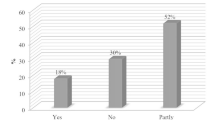Abstract
Changing narrators in a literary passage is a pedagogical technique that can enliven composition, yet which still presents a challenge to students. Assuming the original narrator to be omniscient, any new narrator's perception of a situation can only be fragmentary. The challenge lies in giving that new narrator total awareness of events, and in doing so logically. This means rearranging events, modifying the text, and essentially recreating it. The degree of difficulty can be increased by selecting as narrator a character with limited perception of a situation, or one totally absent from the story. For an added dimension of novelty and challenge, the passage can be narrated from the perspective of an inanimate object.
Similar content being viewed by others
Author information
Authors and Affiliations
Additional information
His training was in medieval French literature, and he published articles on the “chansons de geste” in a number of journals over the years. Beginning quite recently, he has become more interested in pedagogy, i.e., the teaching of French, civilization, creative writing, etc. He has written articles that have appeared and are scheduled to appear in such journals as French Review, Contemporary French Civilization, ADFL Bulletin, on such varied topics as Business French, Creative Writing, and the French Liberation. He received his Ph.D. from Stanford University.
Rights and permissions
About this article
Cite this article
Herman, G. Innovative techniques for advanced writing classes: Modification of point of view. Innov High Educ 12, 101–113 (1988). https://doi.org/10.1007/BF00889606
Issue Date:
DOI: https://doi.org/10.1007/BF00889606




